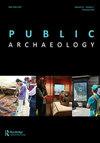Toward an Intermediate Level: Making the Most of Evaluation in Italian Community Archaeology
IF 0.9
4区 历史学
0 ARCHAEOLOGY
引用次数: 5
Abstract
Over the last decade public and community archaeology have established themselves as essential parts of the Italian contemporary archaeological debate, as a result of work at a series of venues and a growing commitment to public engagement within fieldwork. However, data and evaluation reports about participation are rarely found in academic literature, limiting the development of a critical attitude to the topic. This paper attempts to outline a specific scenario for the development of Italian community archaeology as a proper field of research. This scenario consists of two main stages: the development of a shared attitude to evaluation and the creation of a native theoretical framework. Between them there is the ‘intermediate level’, that may be properly considered as the comparison and interpretation of the data resulting from the multiple evaluation processes conducted in Italian community archaeology projects in the context of the existing international theoretical framework. The brief presentation of an evaluation process conducted for the case study of ‘Uomini e Cose a Vignale’ — a long-term excavation project in Tuscany jointly managed by archaeologists and local stakeholders — fosters a reflection on specific opportunities provided by conceiving evaluation as a first step toward an ‘intermediate level’.迈向中级:充分利用意大利社区考古的评估
在过去的十年中,公共和社区考古已经成为意大利当代考古辩论的重要组成部分,这是一系列场所工作的结果,也是公众参与实地工作的日益增加的承诺。然而,在学术文献中很少发现有关参与的数据和评估报告,限制了对该主题批判态度的发展。本文试图勾勒出意大利社区考古学作为一个合适的研究领域发展的具体情景。这一情景包括两个主要阶段:对评价的共同态度的发展和本土理论框架的创建。在它们之间有一个“中间水平”,这可以被恰当地认为是在现有国际理论框架的背景下,对意大利社区考古项目中进行的多重评估过程所产生的数据进行比较和解释。简要介绍了“Uomini e Cose a Vignale”案例研究的评估过程,这是一个由考古学家和当地利益相关者共同管理的托斯卡纳长期挖掘项目,通过将评估视为迈向“中级水平”的第一步,促进了对具体机会的反思。
本文章由计算机程序翻译,如有差异,请以英文原文为准。
求助全文
约1分钟内获得全文
求助全文

 求助内容:
求助内容: 应助结果提醒方式:
应助结果提醒方式:


